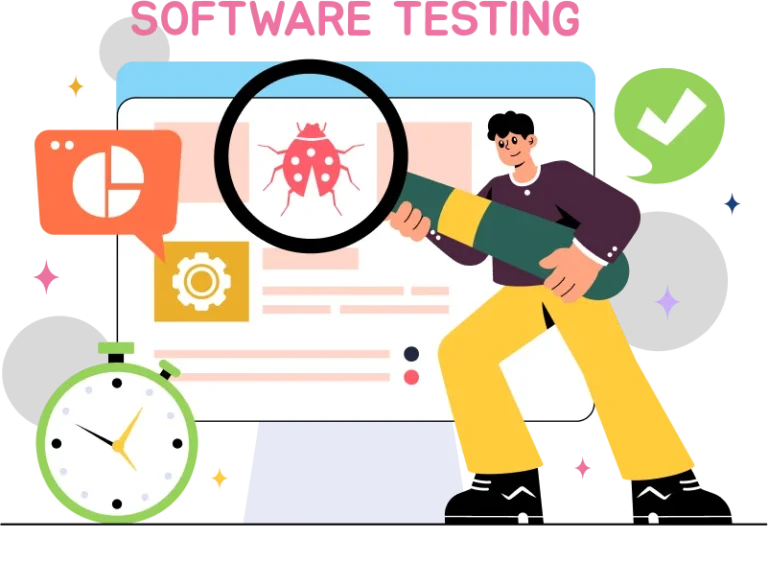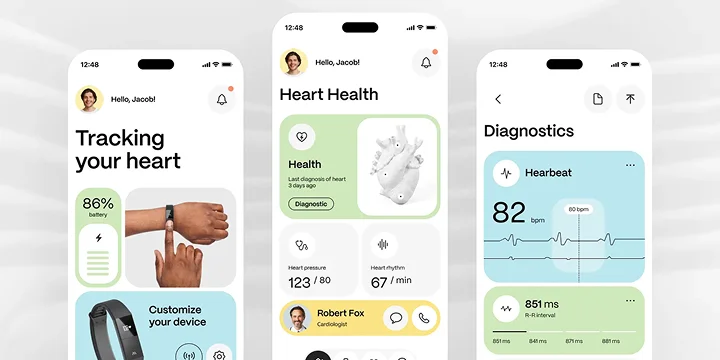Professional Software Testing Services You Can Trust
With over 8 years of experience, Celestial Infosoft is dedicated to ensuring your software products meet the highest standards of quality and performance. Our certified testing professionals work closely with clients in industries such as healthcare, finance, retail, logistics, and manufacturing, providing tailored testing services to meet your project's unique needs.


8+
Years Expertise

350+
Trusted Clients

40+
Certified Tester

100+
Testing Projects
\ Why Testing \
Quality software is the foundation of customer trust and operational efficiency. Our comprehensive testing services uncover issues early, safeguard against security risks, and ensure your applications perform flawlessly under real-world conditions.
Over 70% of software issues surface during production without proper testing.
Early defect detection reduces project costs and shortens release cycles.
Well-tested software enhances user satisfaction, driving higher engagement and loyalty.
Partner with us to deliver software that works, every time.
\ Our Testing Services \

We test web-based applications for functional accuracy, cross-browser compatibility, security, and responsiveness. Our process includes end-to-end validation of user workflows, UI consistency, and backend integrations to ensure a stable and user-friendly experience.

We perform manual and automated testing on native and hybrid mobile apps to verify functionality, UI/UX standards, and performance across various devices, screen sizes, and operating systems. Testing includes network conditions, battery usage, and crash handling.
What makes Celestial different
To our clients, there is no middle ground. When it comes to your success, and it is our business to make it happen. We don’t stop till you meet every technical goal. We are here for you, and as your team, It’s our responsibility to understand and implement your requirements.

\ Core Services \

We verify that every feature of your software works as intended. Our team tests against defined requirements and user scenarios to ensure all functionalities operate correctly under expected conditions.

We check how different modules, systems, or third-party services interact with each other. This ensures data flows correctly and components work seamlessly together, minimizing the risk of integration failures.

We assess how your application performs under expected and peak loads. Our goal is to identify bottlenecks and ensure stability, speed, and scalability before deployment.

We identify vulnerabilities that could put your data, users, or business at risk. Our team performs threat modeling, penetration testing, and vulnerability scanning to protect your software from attacks.

We evaluate the user interface and overall user experience. This helps ensure your application is intuitive, accessible, and meets usability standards, resulting in better user satisfaction.

We re-test existing functionality after updates or bug fixes to ensure that new changes haven’t broken any part of the system. This helps maintain software stability across development cycles.
\ Our Portfolio \






\ Process we follow \
We begin by thoroughly reviewing the project’s functional and technical requirements. This helps us define what needs to be tested and identify any unclear or missing details early in the process. We align with your team to understand business goals and user expectations.
✔ Understand features and workflows
✔ Identify testable requirements
✔ Detect gaps or risks early
Next, we develop a clear test plan that defines the scope, strategy, timeline, testing types, resource allocation, and tools we’ll use. This plan ensures transparency and aligns our testing process with your delivery schedule.
✔ Define test objectives and scope
✔ Select tools (manual and automated)
✔ Assign responsibilities and create a test schedule
Based on the plan, we create detailed test cases and test scenarios that cover both common and edge use cases. If automation is applicable, we design reusable test scripts alongside manual tests.
✔ Write step-by-step test cases
✔ Create data for positive & negative testing
✔ Design scripts for automation (if needed)
Our QA team executes the test cases in a controlled environment and records actual outcomes. Any bugs or inconsistencies are logged with full detail including screenshots, logs, and reproduction steps and communicated to the development team.
✔ Manual & automated test execution
✔ Log, track, and prioritize bugs
✔ Collaborate with developers for quick resolution
Once all critical issues are resolved and testing goals are met, we prepare a comprehensive test summary report. This includes key metrics, test results, unresolved issues (if any), and suggestions for improvement.
✔ Final status of test execution
✔ Defect summary and trend analysis
✔ Recommendations for future releases
\ Our Expertise \
We maintain detailed execution logs for every test case, including run time, environment settings, input values, and system responses, ensuring complete visibility into every test activity.
All identified issues are accompanied by rich diagnostic data such as error messages, failure points, stack traces, and environment conditions to accelerate root cause analysis and resolution.
Our reports provide measurable data on automated test performance, including test coverage, pass/fail ratios, execution time, and areas not yet automated, helping teams evaluate ROI and testing effectiveness.
Whether you need high-level business overviews or deep technical data, our reports can be customized to match your audience and priorities. We align with your team to include relevant KPIs and custom sections.
For every critical finding, we include prioritized, actionable suggestions from quick fixes to long-term quality improvements, helping you plan and reduce future testing effort.
\ Few Words \
"We didn’t just need testers, we needed people who think like users and spot issues before they become problems. Celestial Infosoft delivered exactly that. The team was sharp, responsive, and really easy to work with."
"What stood out was their attention to detail. Every bug came with clear steps, impact analysis, and suggestions. They didn’t just test, they helped us build confidence before launch."
"It’s rare to find a QA partner who understands both agile speed and enterprise discipline. Celestial Infosoft found that balance. Our sprints actually moved faster with them on board."
"We were initially hesitant to outsource testing, but Celestial made it feel like they were part of our in-house team. Clear reports, real communication, and they genuinely cared about the end product."
\ FAQs \
Software testing is the process of evaluating a software application to identify defects and ensure it meets the specified requirements. It's crucial because it helps detect bugs early, ensuring the software functions as intended, meets user expectations, and maintains a high standard of quality. This proactive approach reduces the risk of failures and enhances user satisfaction.
Software testing encompasses various types, including:
Unit Testing: Focuses on individual components or modules.
Integration Testing: Assesses the interaction between different modules.
System Testing: Evaluates the entire system's compliance with specified requirements.
Acceptance Testing: Determines if the software meets user needs and is ready for deployment.
Regression Testing: Ensures new code changes haven't adversely affected existing functionalities.
Performance Testing: Checks the software's responsiveness, scalability, and stability under load.
Security Testing: Identifies vulnerabilities and ensures data protection.
Usability Testing: Assesses how user-friendly and intuitive the software is.
Each type serves a specific purpose in ensuring the software's overall quality and reliability.
Bugs are reported using structured processes and tools like JIRA or Azure DevOps. Each bug report includes:
Detailed Description: Clear explanation of the issue.
Reproduction Steps: Step-by-step guide to replicate the issue.
Severity Assessment: Indicates the impact level of the bug.
Screenshots/Logs: Visual evidence or logs to support the report.
This structured approach ensures efficient tracking and resolution of issues.
The duration of software testing depends on several factors, including the project's complexity, scope, and the types of testing required. For a medium-complexity platform, testing can take up to 10 working days, excluding time for bug fixes. It's essential to collaborate closely with the testing team to establish realistic timelines that align with project goals.
Yes, retesting is a standard part of our testing process. After developers address reported bugs, we conduct retesting to verify that the fixes work as intended and that no new issues have been introduced. Typically, our service includes up to 30 retests per test case, ensuring comprehensive validation of the fixes.
We are curious to discuss your dream web project!

© Copyright 2025 Celestial Infosoft. All rights reserved.